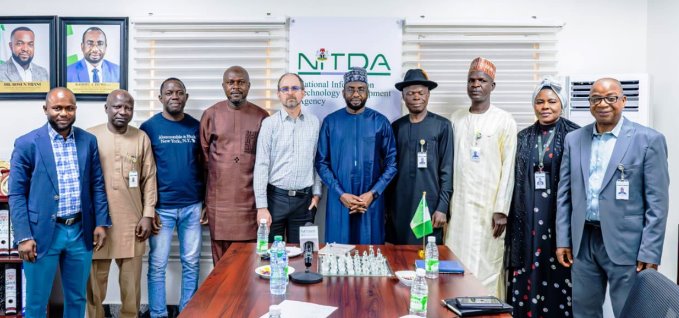Kachifu Inuwa Abdullahi, the Director General of the National Information Technology Development Agency (NITDA), has expressed readiness to collaborate with the United States Agency for International Development (USAID) and other stakeholders to combat food insecurity in Nigeria, leveraging the country’s vast arable land exceeding 70 million hectares, which has the potential to not only sustain Nigeria but the entire African continent.
RELATED: NAVSA: NITDA targeting to create 5,000 smart farmers among varsity students
This commitment was articulated during a meeting held at NITDA’s headquarters in Abuja, where representatives from USAID, led by Josh Woodard, Senior Digital Advisor at the Bureau for Resilience, Environment, and Food Security, engaged with NITDA officials. The aim of the meeting was to conduct a rapid assessment of digital agriculture in Nigeria and explore potential partnerships with NITDA.
Abdullahi emphasized NITDA’s role in leveraging IT to enhance productivity across critical sectors, including agriculture, aligning with President Tinubu’s focus on boosting agricultural productivity for food security. In line with this vision, NITDA has identified six emerging technologies to drive advancements in agriculture:
- Artificial Intelligence (AI) for developing strategies to optimize agriculture, healthcare, and education.
- Internet of Things (IoT) for monitoring crop and soil conditions, irrigation, climate, and livestock.
- Unmanned Aerial Vehicles (UAVs) for pest detection, water management, and yield assessment.
- Blockchain for traceability of farm produce, record-keeping, and quality assurance.
- Robotics for automating farm processes like weeding and harvesting.
- Additive manufacturing for scaling up manufacturing in agriculture, producing monitoring devices, and customized equipment.
In addition to these technological initiatives, Abdullahi highlighted NITDA’s efforts to nurture digital entrepreneurship through initiatives like the Nigeria Startup Portal, which has already attracted over 12,000 registered startups. These startups will receive labeling and access to incentives to foster their growth and contribution to the digital economy.
Woodard emphasized the importance of integrating digital technologies into agriculture to enhance food security. USAID recently launched the Global Food Security Strategy for Nigeria (2024 -2029) in collaboration with the Federal Ministry of Agriculture and Rural Development, aiming to work with stakeholders to address food security challenges in Nigeria.
The meeting also discussed the National Adopted Village for Smart Agriculture (NAVSA) initiative, highlighting its success stories, expansion plans, and inviting USAID to participate in these initiatives to further drive progress in addressing food insecurity in Nigeria





























